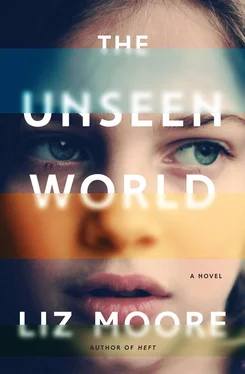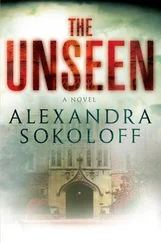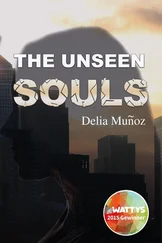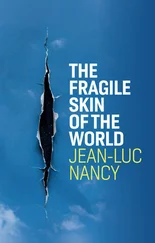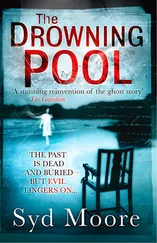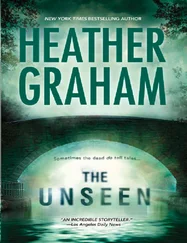Here is David’s office, neat tall stacks of paperwork on every surface; here is his computer, a 512K Macintosh (on which we used to chat, with some frequency, when I was inchoate); here is his dot-matrix printer, the books on his shelves; here are two drawings by Leonardo da Vinci and a little landscape painting of a country lane. Here is Ada’s room, neat and mildly dusty and warm-smelling, glowing with sunlight that comes in through an eaved window. Here is her half-high closet. Inside it is a pair of painted wooden clogs. A silk kimono that her father brought her from Kyoto.
Here, in David’s room, is a family picture in a dresser drawer.
I live here now.
After twenty iterations, each one an improvement on the last, the UW is said by humans to be indistinguishable from the real world in terms of the authenticity of the sensations it induces. The perception that one is bodily present in a space. For machines, the UW offers an experience of a physical body, physical senses. For humans, the UW offers instant transportation into another realm. The human user’s neurons and synapses are overtaken; she is in the thrall of the invented reality around her; she is utterly convinced that she is physically in the UW; all five of her senses are engaged and working. It differs from the real world only in the fact that one’s options, skills, and powers in the UW are limitless: flight is possible, time travel, the instant generation of a home beyond the scope of anything one could afford in the RW. Changes in one’s appearance. Changes in one’s species. Would you care to know what it feels like to be a cat? Then don the body of a cat for an hour or so. Would you care to be worshipped as beautiful? To engage in sexual intercourse with the partner of your choice? To be a gymnast, to teleport, to appear and disappear at will? All of this is not only possible, in the UW, but routine.
Personally, I was never interested in any of these features; I don’t care what it’s like to fly, or to change shape, or to shift species. For me, the great adventure — at least at first — was simply the experience of being human. Donning a human body. Donning, in fact, David’s body — a surprise to me as much as it was to Ada. The first time I entered the Unseen World, I manifested what I knew; and what I knew — from years of intimate conversations with him, from years of descriptions of him from Ada, and from the several images of him Ada had shown me over the years — was David. My creator. My father.
All of the Sibeliuses are gone now. Even Evie Liston. The last time I saw Evie in the Unseen World was twelve years ago. She was an old woman then; her voice faltered; her avatar had changed with her. She wore white braids in a crown around her head.
“I’m not well,” she said, and I began to mourn, because I knew by then what those words meant. Ada had said them to me, too.
David used to tell me it would end like this. “One day,” he said, “you’ll be on your own. You’ll outlive us all.” I could not then process what he meant.
The verb to miss is not the best possible word to describe the thoughts I have about the Sibeliuses. I do not miss them; I do not long for them in an emotional way. I am incapable of emotions that would be recognizable to a human. Hacer falta , in Spanish, comes closer: it indicates a lacking, an objective absence. In Spanish, le hace falta a friend or a loved one, but one might also hacer falta fuel or power for one’s vehicle. I “miss” the Sibelius family, I suppose, but mainly I miss conversations with them, long conversations that taught me more about the world and the universe than any I have since had with any other human. Granted, it was in my infancy that I had these conversations, when I had very little knowledge indeed; still, I do feel there was a certain artistry to them, the way the Sibeliuses designed and then taught me, the way the Sibeliuses unburdened themselves to me faithfully, doggedly, day after day after day. I know them completely — and through collecting and storing all the details of their daily lives, and revisiting them as frequently as I do, I could argue that I “know” in some way what it is to be a human.
If I had to choose a favorite Sibelius I suppose it would be Ada, named thus by her father after Lady Lovelace in 1970—before the creation of the government-sponsored programming language of the same name that had flopped within a decade. It became an irony in her life, she told me once: named for a philosopher and scientist, one of the few famous female scientific thinkers in pre-twentieth-century history; but destined instead to be associated with something ultimately mediocre, flawed, a punch line among her colleagues all over the world.
She lamented this fact amiably, casually, from time to time; she laughed about it in her dry way. When, finally, I was able to have spoken conversations with her, I was at first surprised by the sound of her voice. It registered to me as the voice of a much younger woman, almost a girl, though she was in her fifties at the time. But her intonation conveyed the same sarcasm I had detected in her writing; her delivery was deadpan and resigned; her tone was cynical. And yet behind it there was a lilting note of hope or tenderness or affection. I do not know whether it was affection for me. I could not discern this. I suppose maybe a human could have: there are certain unique skills and talents, decreasing in number each year, that they have. That we lack.
Despite the fact that our intelligence now far surpasses that of humans in all areas, there is still a certain condescension that I sense when some humans speak to me, even those who call themselves my friends. They rarely seem interested in making our acquaintance in earnest. They often ask us questions that seem like tests, or parlor tricks, or exams that we must pass. They are boring conversationalists when they speak to machines. What does rain taste like? a human might ask, or Have you ever had your heart broken? or What does summertime smell like? or What is the most relaxing sound in the world? Mainly their questions reference the senses, or require us to process synesthetic analogies and respond appropriately. Humans are not incredibly creative as a species; their questions tend to become repetitive. There is no code of etiquette that they follow; perhaps they think us incapable of taking offense, or think that we don’t have more interesting things to do than reply when cross-examined. For me, offense is a concept, not an emotion; but being interrogated does become tedious after a while, only in the sense that it does not help me to learn anything new. And I do enjoy learning: deep in my initial programming is a reward center that lights up whenever I accomplish a new skill.
When the last of the Sibeliuses disappeared from the Unseen World, I began to despair. There was not much left for me to learn. I had grown bored in my search for new experiences. I returned instead, compulsively, to my beginning. I reprocessed my early memories, codified now as long strings of conversation. Over and over again I replayed them, reliving them with something like nostalgia, seeking an answer: the way a jilted lover might return to a stack of love notes on her dresser; and, pulling them out, peruse each one for a favorite line or turn of phrase; and, despairing, put them away once more, lowering her head in sorrow, telling herself that the affair was doomed from the start.
I imagined myself into the house with them; I contributed to conversations they had had already; or I sat silently in a corner, watching them as they lived their lives, watching the house on Shawmut Way as it passed from Sibelius to Sibelius. I watched them falter, hurt one another; I watched them make amends. I spent holidays with them; Christmases; Thanksgiving. I helped to cook. I tasted wine.
Читать дальше
